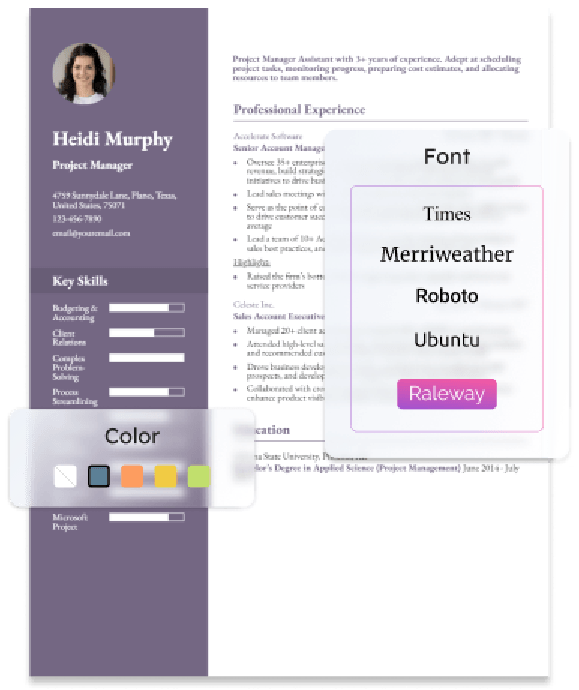You’re well-versed in drafting persuasive legal arguments and navigating complex legal documents as an attorney. However, summarizing your qualifications, experience, and accomplishments on a resume can be a different challenge.
To make your resume as impactful as your legal briefs, it’s essential to highlight your specialized skills, case successes, and expertise in specific practice areas. We’ve compiled a list of tips, examples, and templates designed specifically for legal professionals so you can present yourself as a top candidate and take the next step in your legal career.
“Attorney resumes must reflect legal expertise, case results, and strong research and writing skills. Tailor each resume to your practice area.”
— Carolyn Kleiman, Resume and Career Advisor
Most Popular Attorney Resumes
Entry-Level Attorney Resume
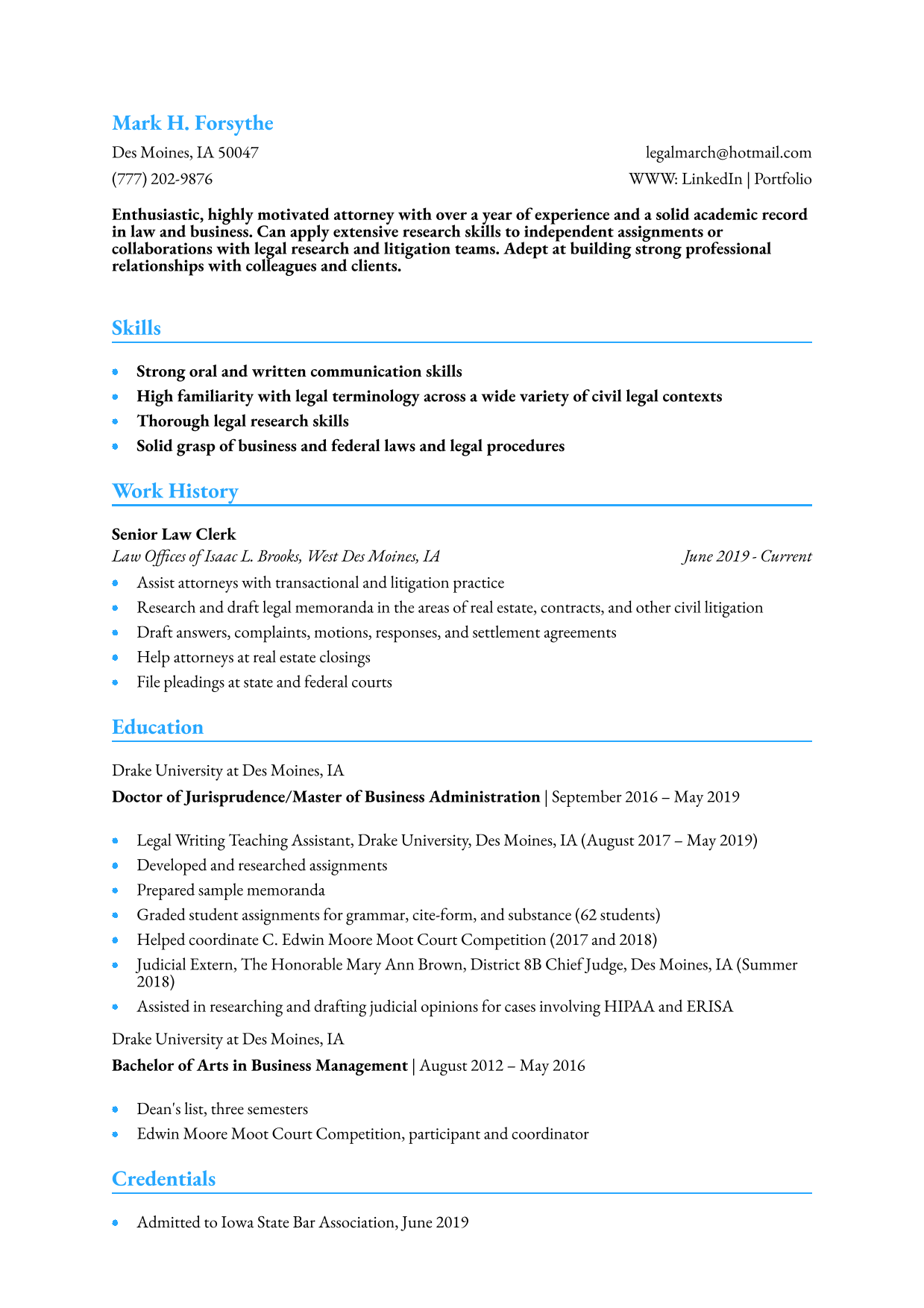
Why This Resume Works
Marc’s resume demonstrates a strong academic foundation paired with hands-on legal experience as a law clerk. It highlights key skills like legal research and transactional support, making it appealing for entry-level attorney positions.
Learn how to list relevant coursework effectively: How to List Relevant Coursework on Resume.
Mid-Level Attorney Resume
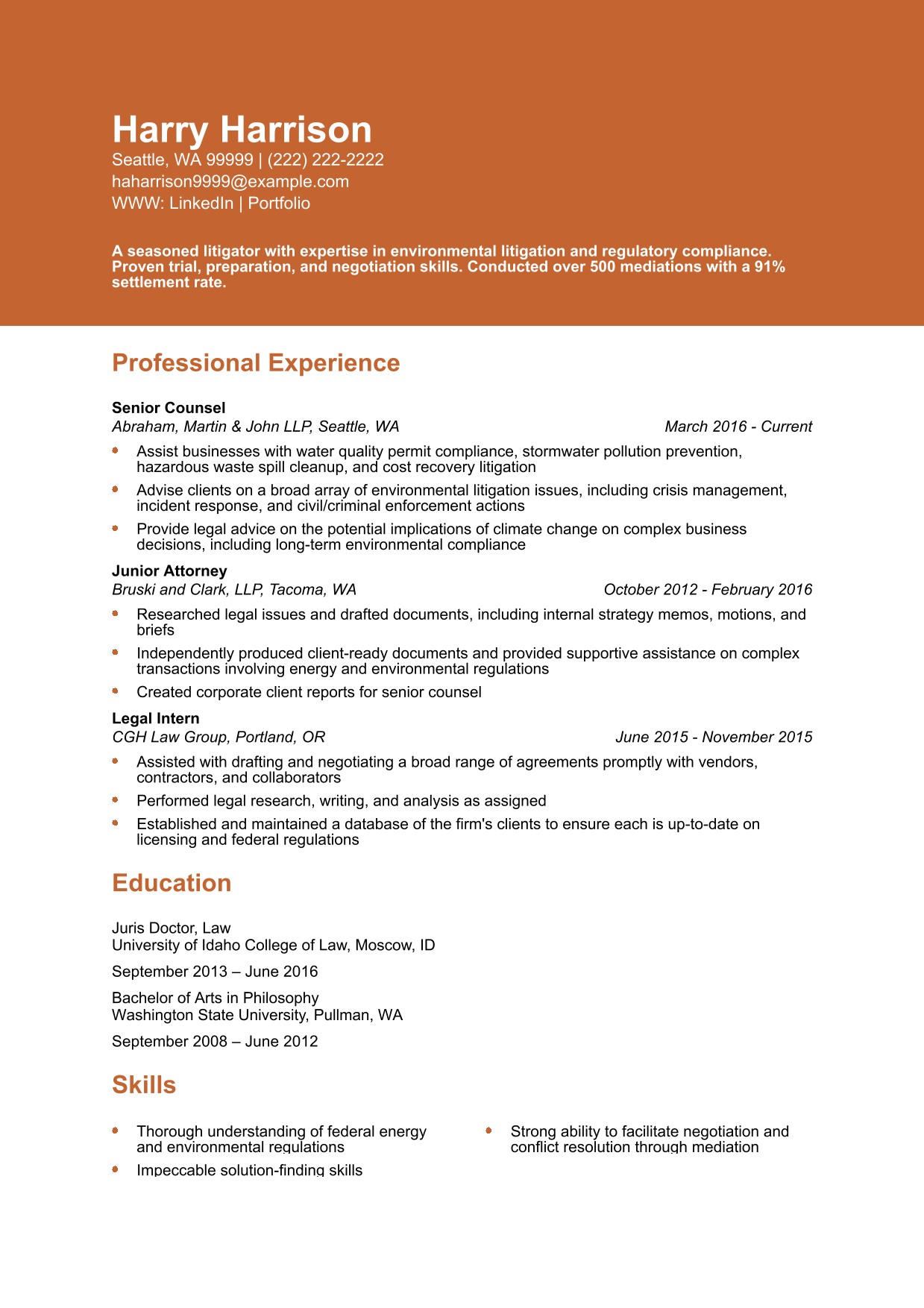
Why This Resume Works
Harry’s resume highlights extensive experience in environmental litigation and regulatory compliance, backed by metrics like a 91% mediation settlement rate. It effectively showcases his skills in negotiation and trial preparation.
Learn how to feature litigation metrics: Resume Outline Examples.
Senior-Level Attorney Resume
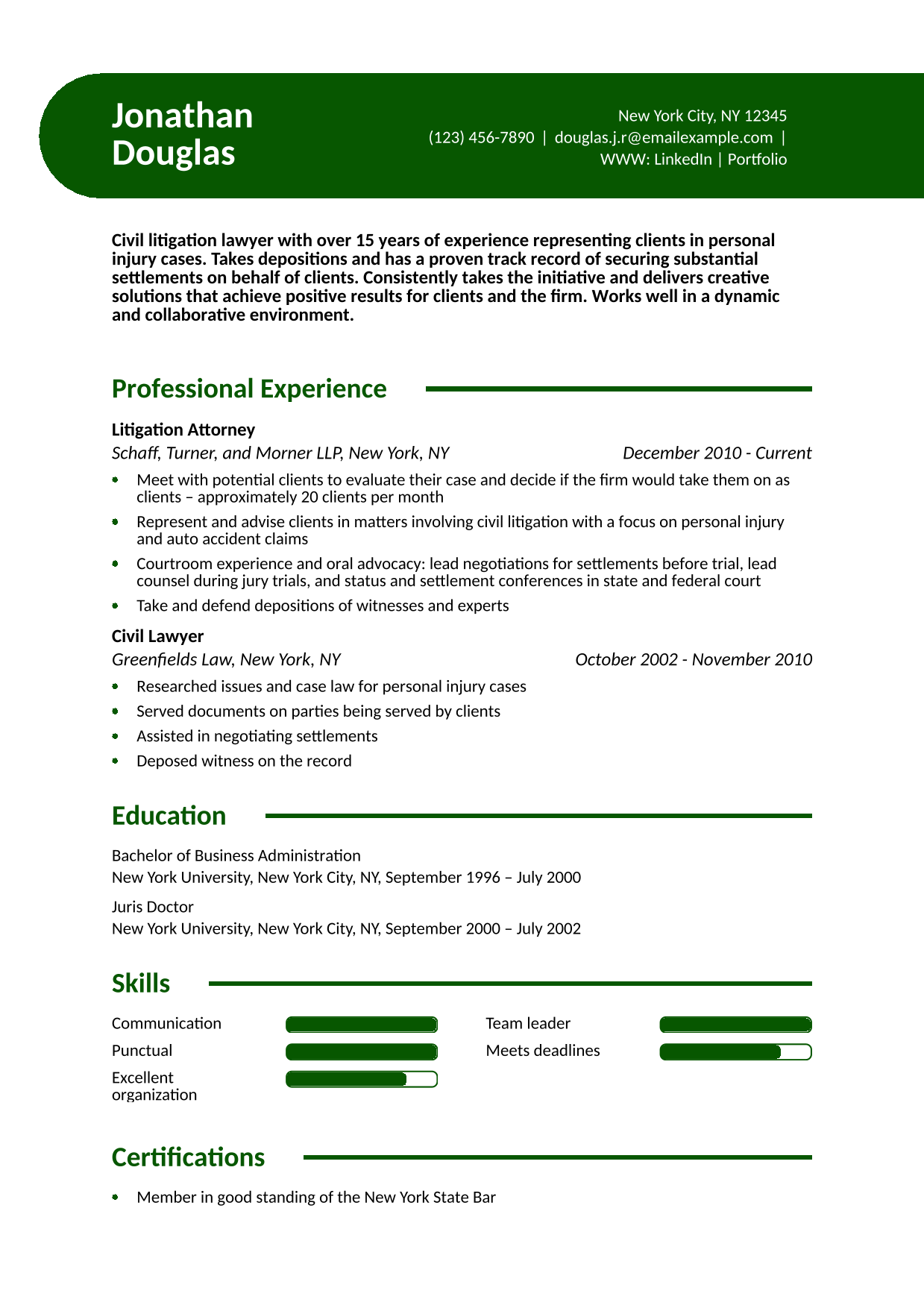
Why This Resume Works
Jonathan’s resume emphasizes 15+ years of litigation expertise with measurable achievements, such as managing 20 clients per month and securing substantial settlements. The focus on courtroom advocacy and client representation makes this a strong senior attorney profile.
Learn how to present leadership and expertise: Resume Summary Examples.
Corporate Attorney Resume
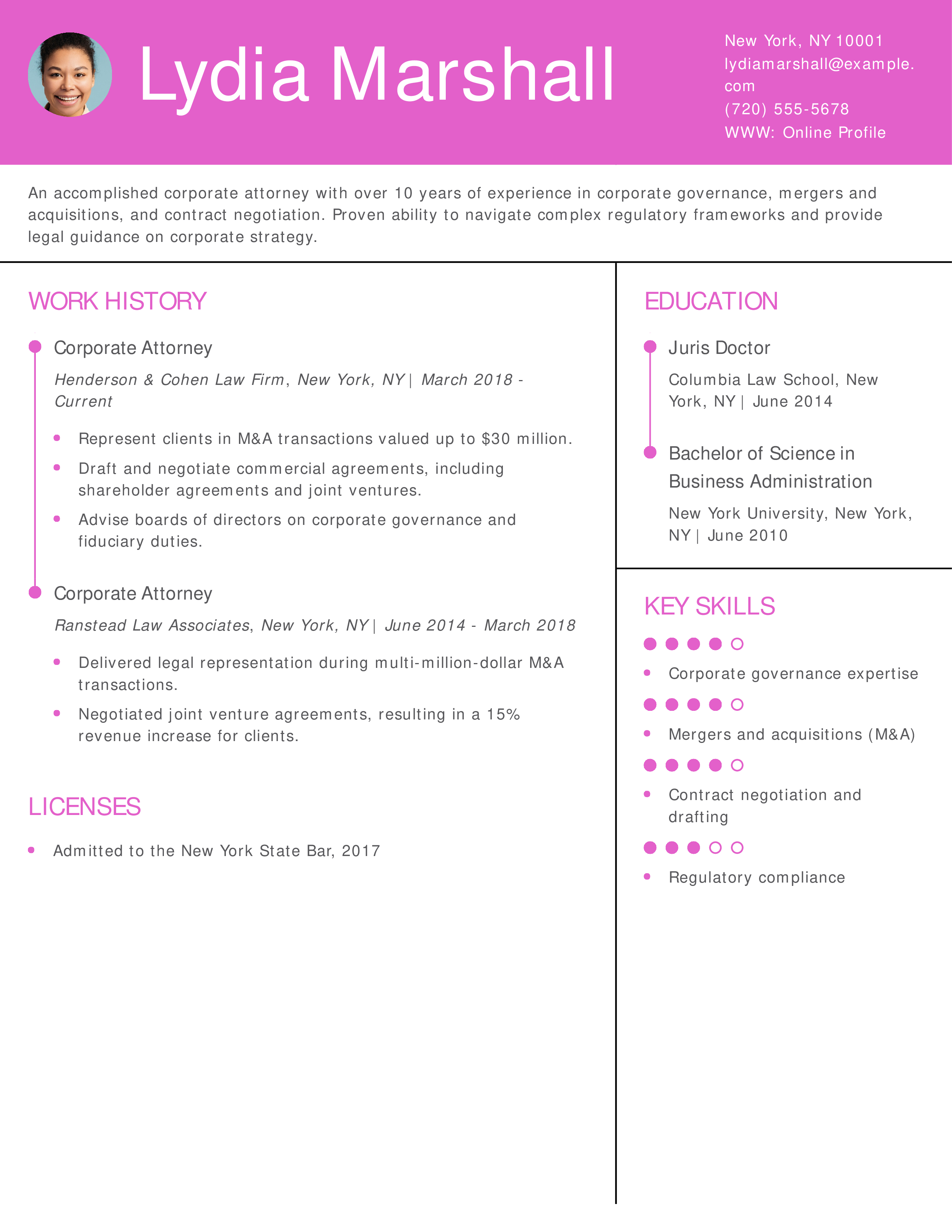
Why This Resume Works
Lydia’s resume highlights her ability to handle high-value transactions and provide legal advice on corporate governance. Metrics such as $30 million M&A deals and a 15% client revenue increase emphasize her impact in corporate law.
Learn how to highlight accomplishments in business law: Resume Skills.
Litigation Attorney Resume
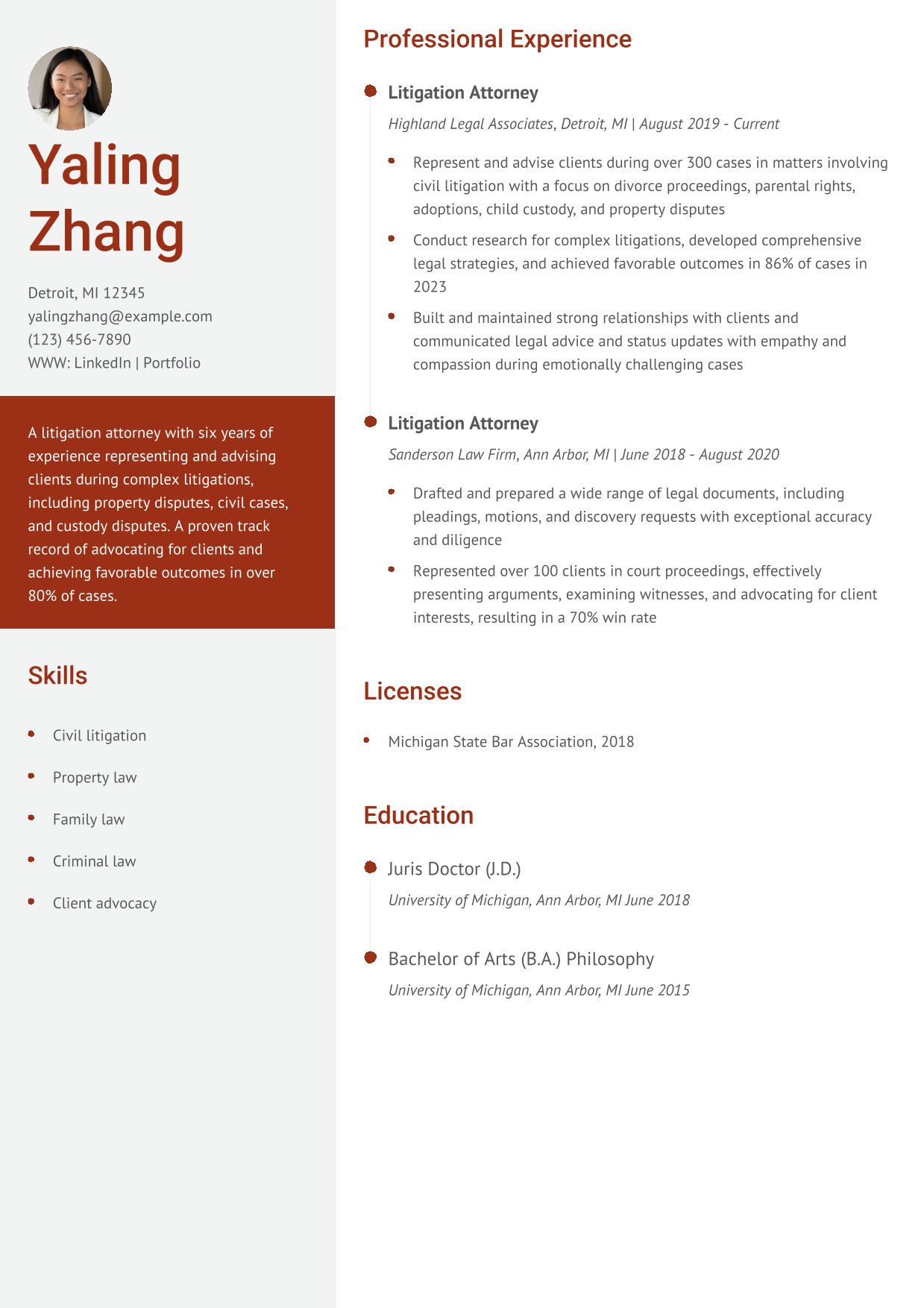
Why This Resume Works
Yaling’s resume emphasizes their expertise in civil litigation, with quantifiable success rates like achieving favorable outcomes in 86% of cases. Highlighting their ability to manage emotionally charged cases makes this profile compelling for litigation roles.
Learn how to use metrics in legal resumes: How to Make a Resume.
Real Estate Attorney Resume

Why This Resume Works
Allison’s resume emphasizes her ability to handle high-value real estate transactions and resolve disputes effectively. Metrics like 230 transactions and 50 dispute resolutions underscore her expertise.
Learn how to leverage numbers in real estate law resumes: Resume Outline Examples.
Immigration Attorney Resume
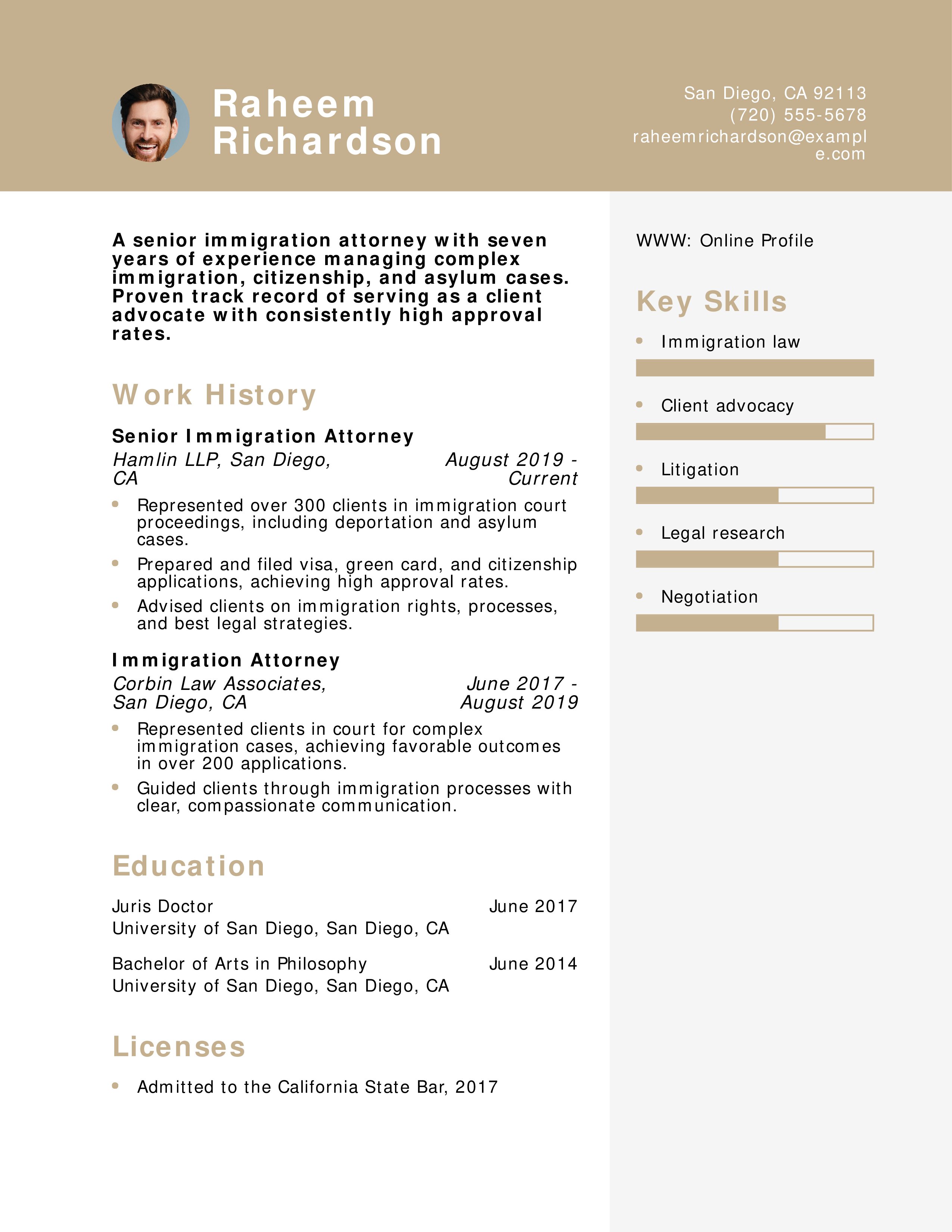
Why This Resume Works
Raheem’s resume showcases extensive experience in high-stakes immigration cases and his ability to manage a high-volume caseload effectively. Metrics like 300 court representations and high approval rates demonstrate his expertise.
Learn how to emphasize volume and impact: Resume Skills.
Associate Attorney Resume
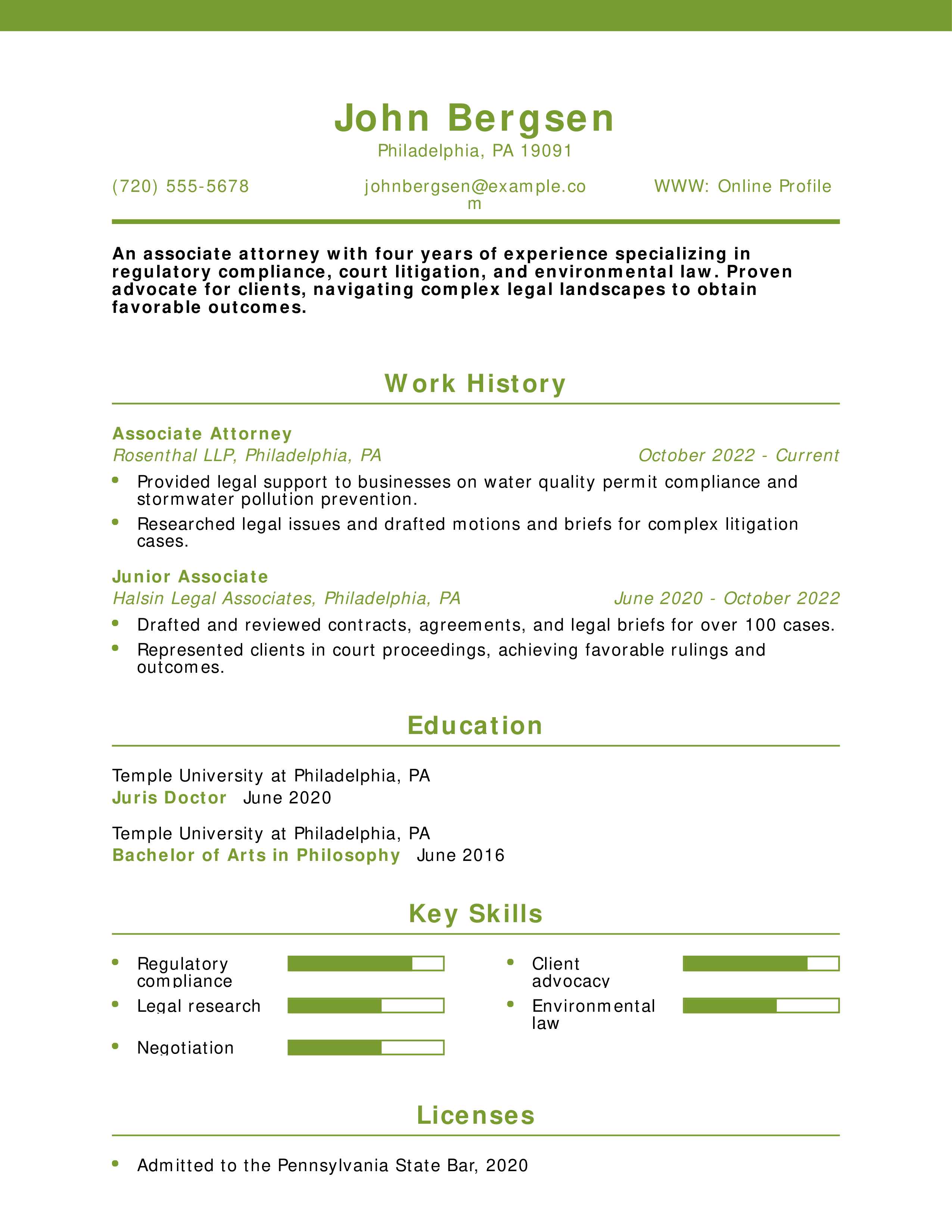
Why This Resume Works
John’s resume highlights his diverse legal experience, particularly in regulatory compliance and environmental law. Metrics like 100 resolved cases provide tangible evidence of his impact.
Learn how to position expertise in niche areas: Resume Summary Examples.
Civil Litigation Attorney Resume
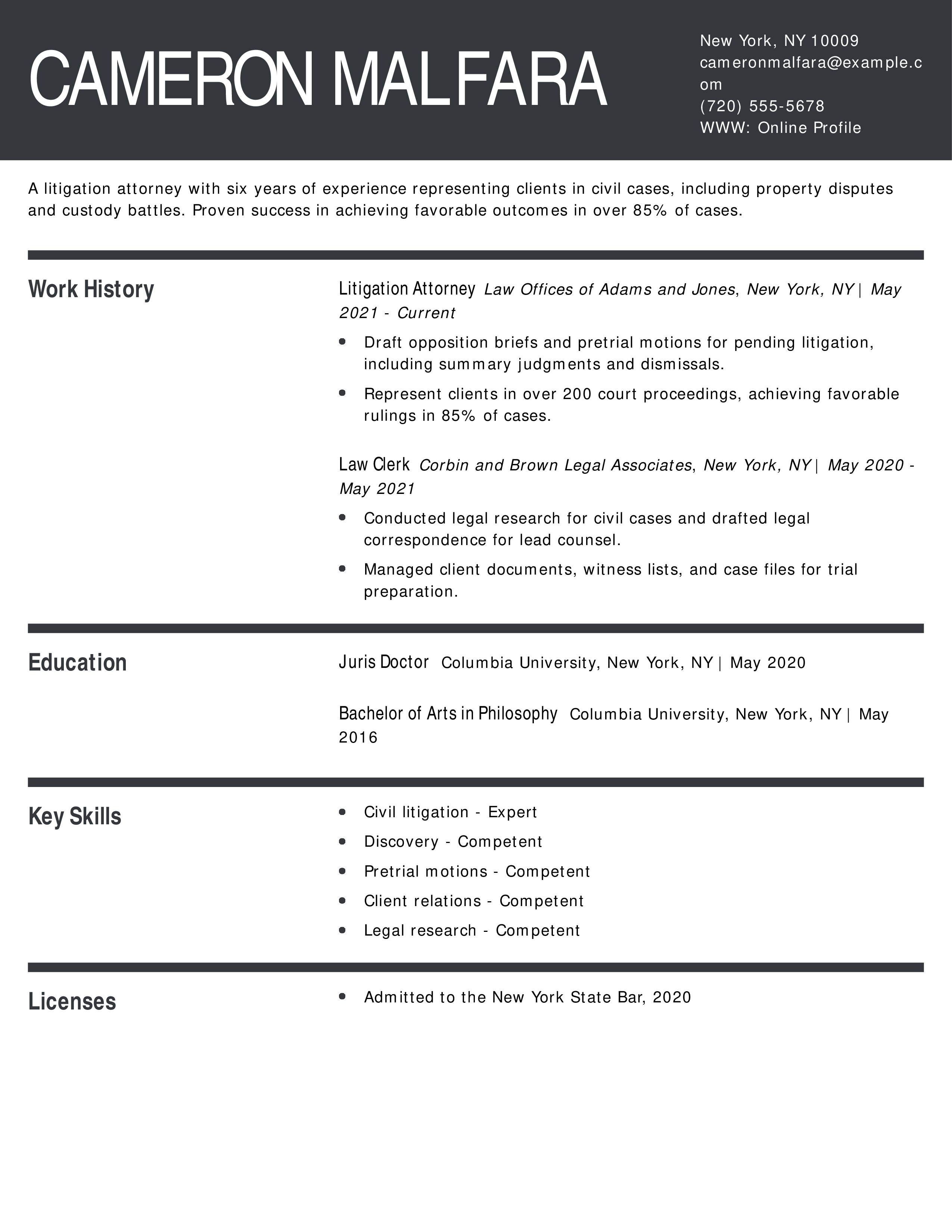
Why This Resume Works
Cameron’s resume highlights their expertise in civil litigation, with strong metrics such as 85% favorable rulings. Their ability to handle discovery and pretrial motions makes them a valuable candidate for litigation roles.
Learn how to emphasize litigation results: Best Resume Formats.
Family Law Attorney Resume
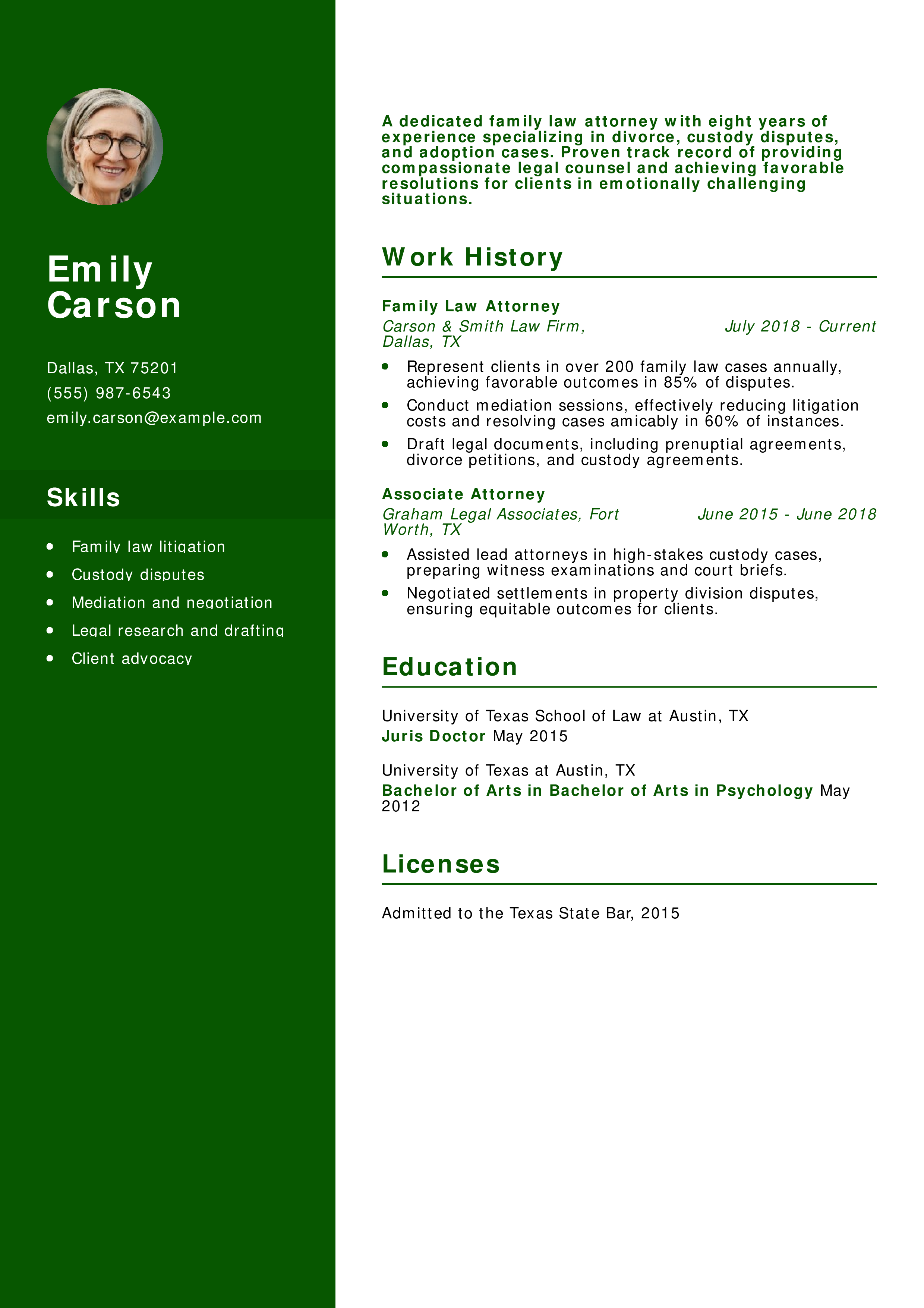
Why This Resume Works
Emily’s resume effectively combines her expertise in family law with her ability to handle high-stakes and emotionally charged cases. Metrics like an 85% favorable outcome rate and mediation success rates highlight her skill as a family advocate.
Learn how to present client-centered achievements: Resume Objective Examples.
Trademark Attorney Resume
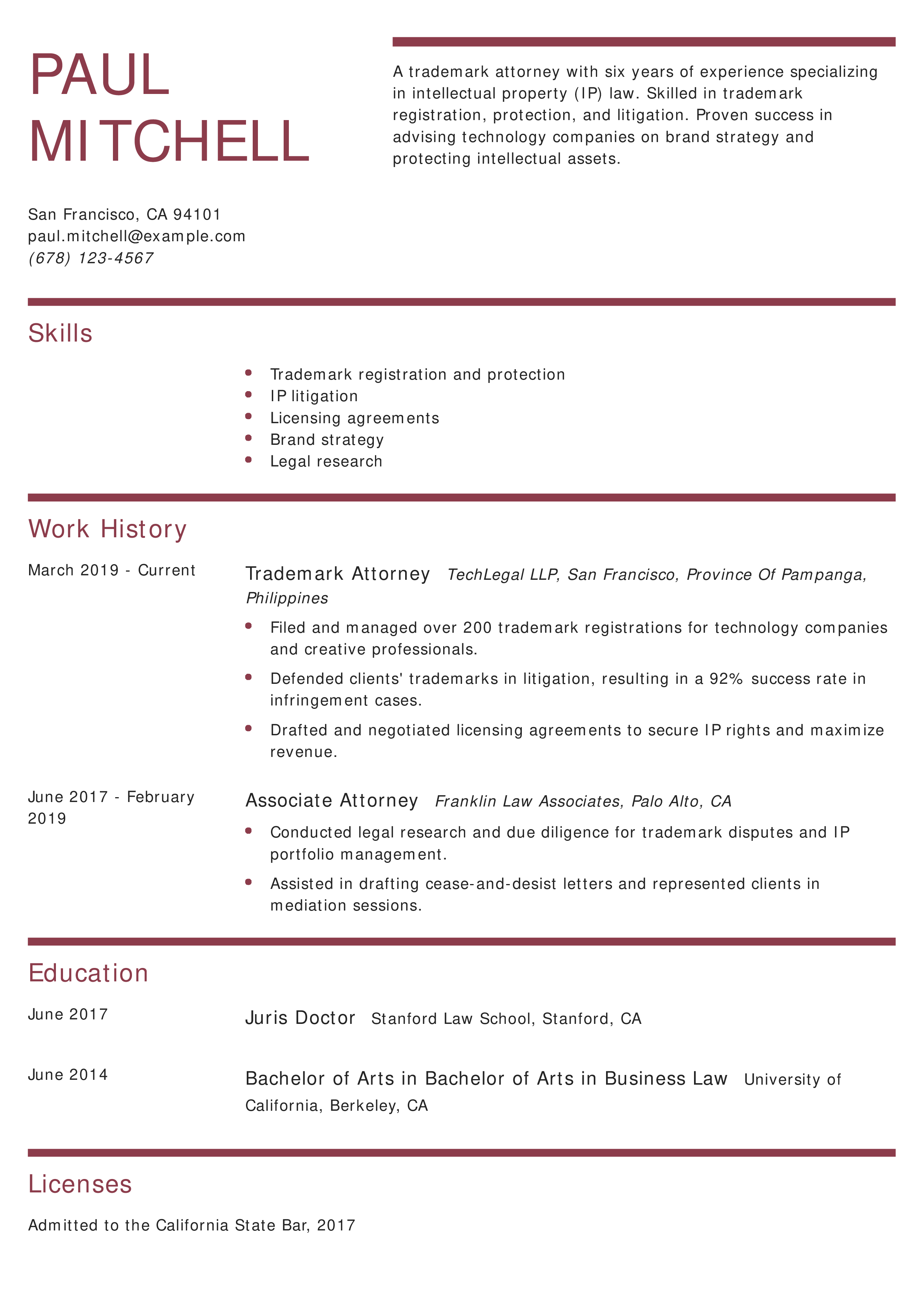
Why This Resume Works
Paul’s resume highlights his ability to handle trademark litigation and registration effectively, with metrics like a 92% litigation success rate. His focus on technology clients demonstrates a niche expertise that sets him apart.
Learn how to emphasize IP law skills: Resume Skills.
Senior Litigation Attorney Resume
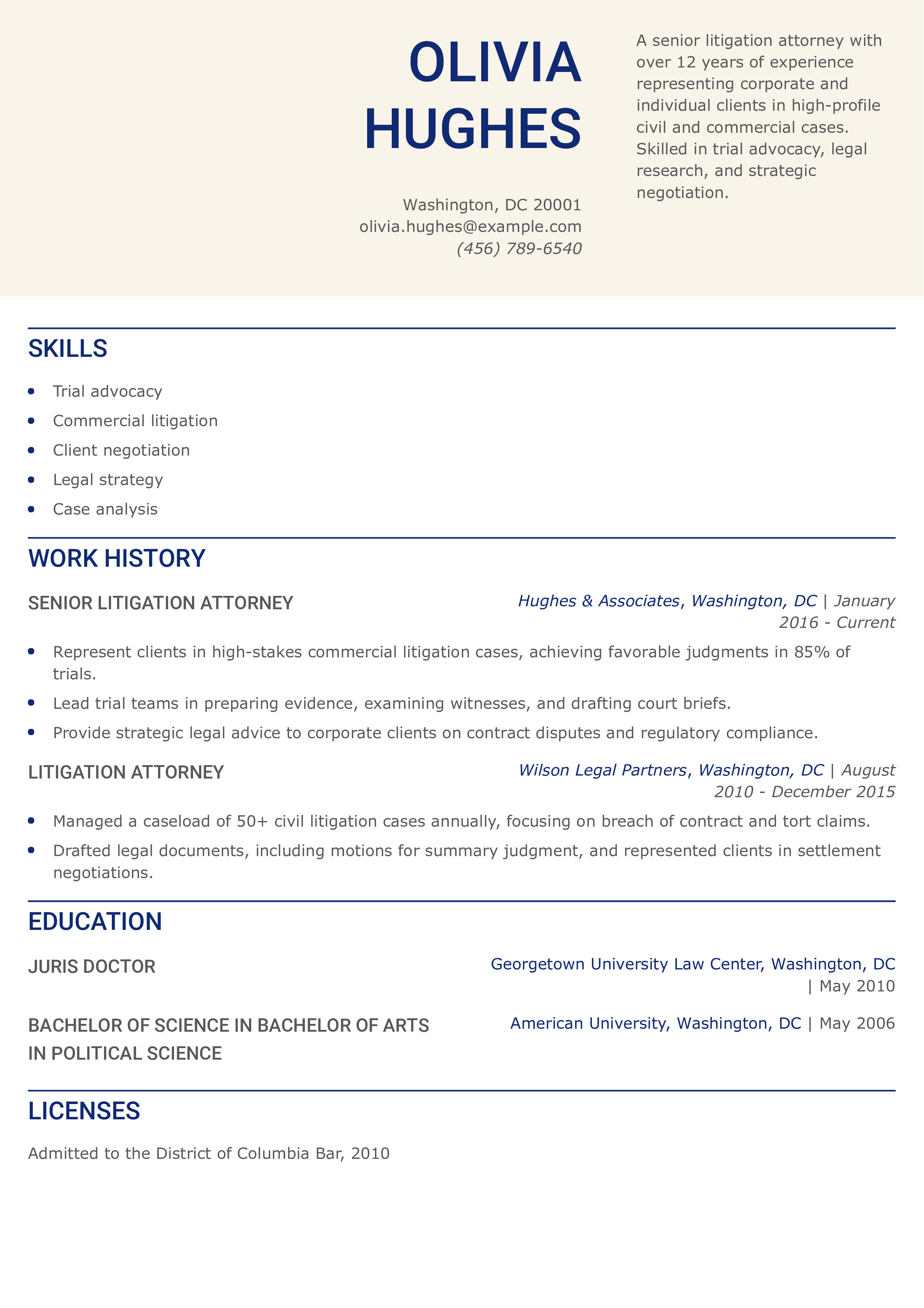
Why This Resume Works
Olivia’s resume underscores her extensive litigation experience with a focus on commercial cases and trial advocacy. Metrics such as an 85% trial success rate highlight her effectiveness as a senior attorney.
Learn how to present senior-level achievements: Best Resume Formats.
Contract Attorney Resume
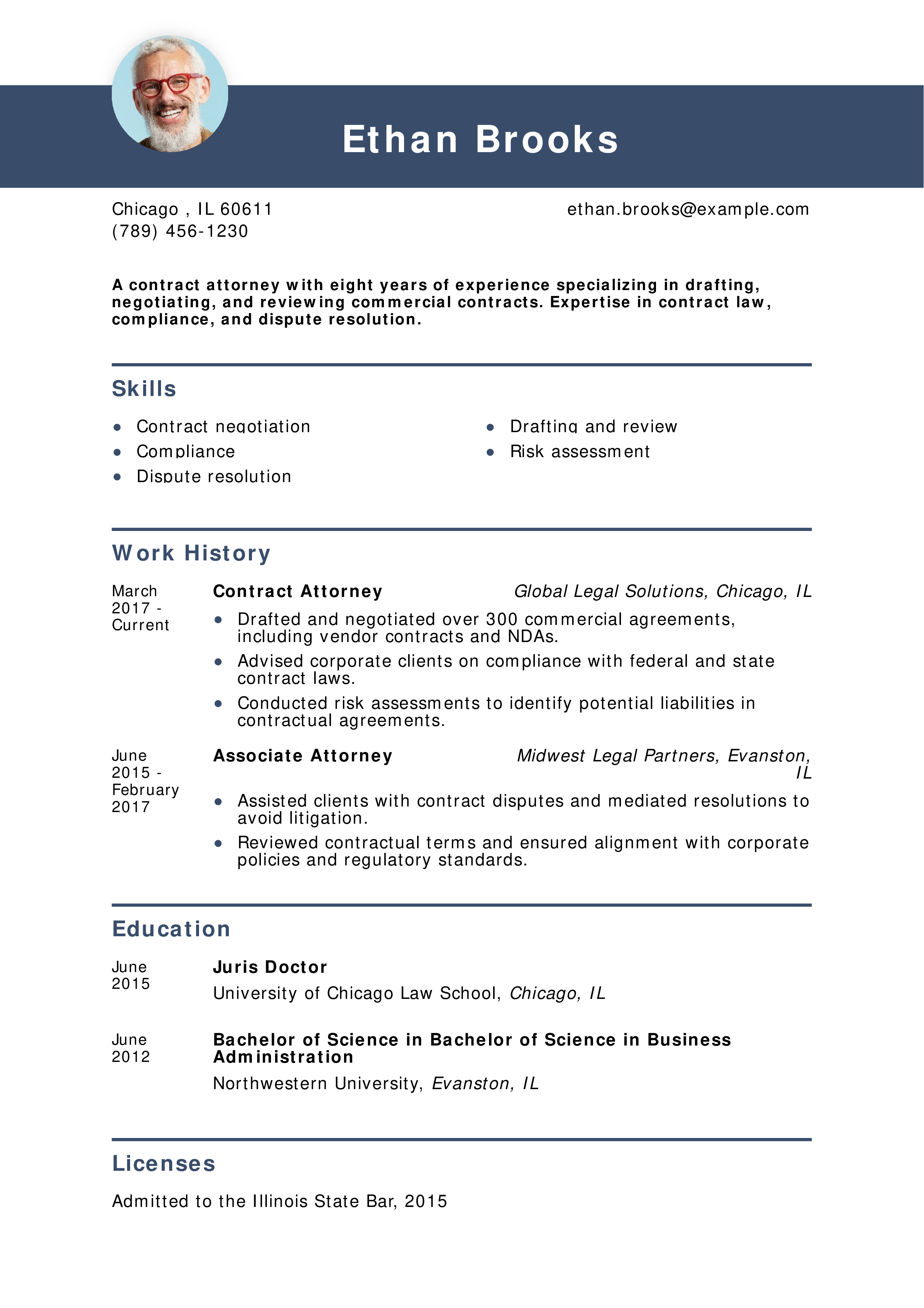
Why This Resume Works
Ethan’s resume highlights his ability to handle high volumes of contracts effectively while ensuring compliance and mitigating risks. Metrics such as 300 agreements emphasize his productivity and expertise.
Learn how to feature compliance and negotiation skills: Resume Outline Examples.
Transactional Attorney Resume
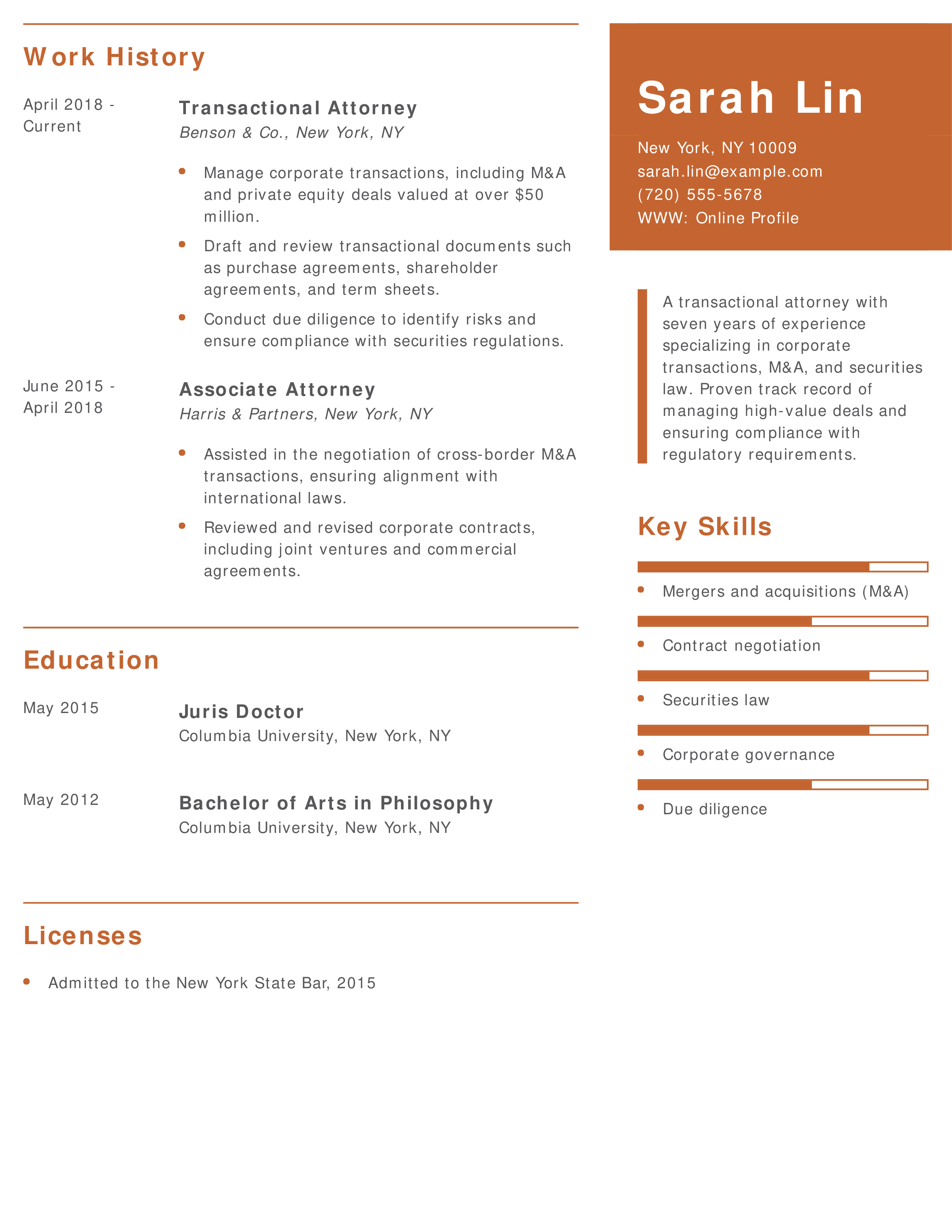
Why This Resume Works
Sarah’s resume emphasizes her ability to handle complex transactions, with quantifiable achievements such as managing deals worth $50 million. Her expertise in securities law and due diligence further strengthens her candidacy.
Learn how to showcase deal-making experience: Resume Skills.
Senior Corporate Attorney Resume
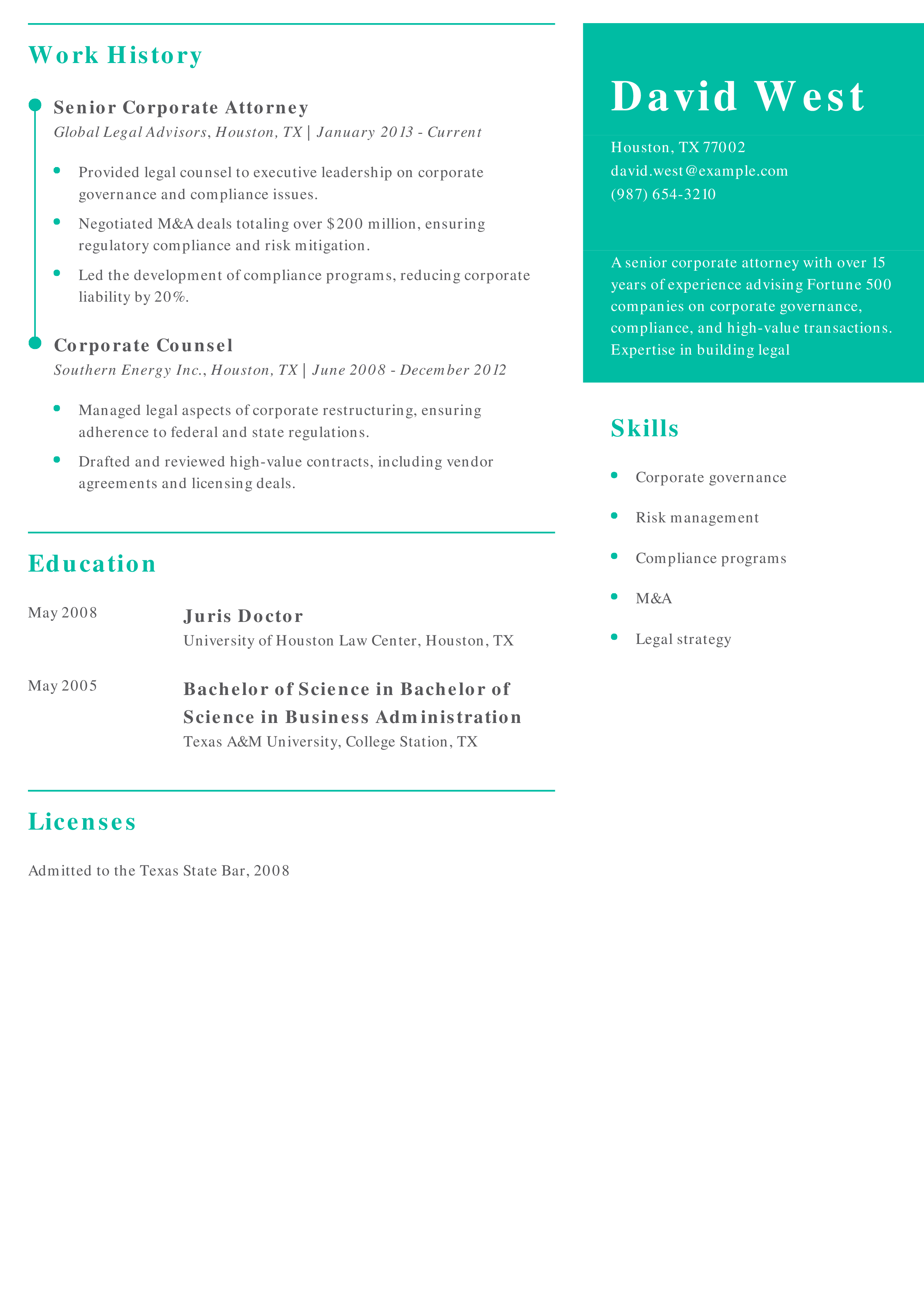
Why This Resume Works
David’s resume showcases a strong background in corporate law, with quantifiable achievements like $200 million in M&A deals and a 20% reduction in liability. His expertise in governance and compliance aligns well with senior-level roles.
Learn how to emphasize leadership and impact: Resume Summary Examples.
Entry-Level Real Estate Attorney Resume
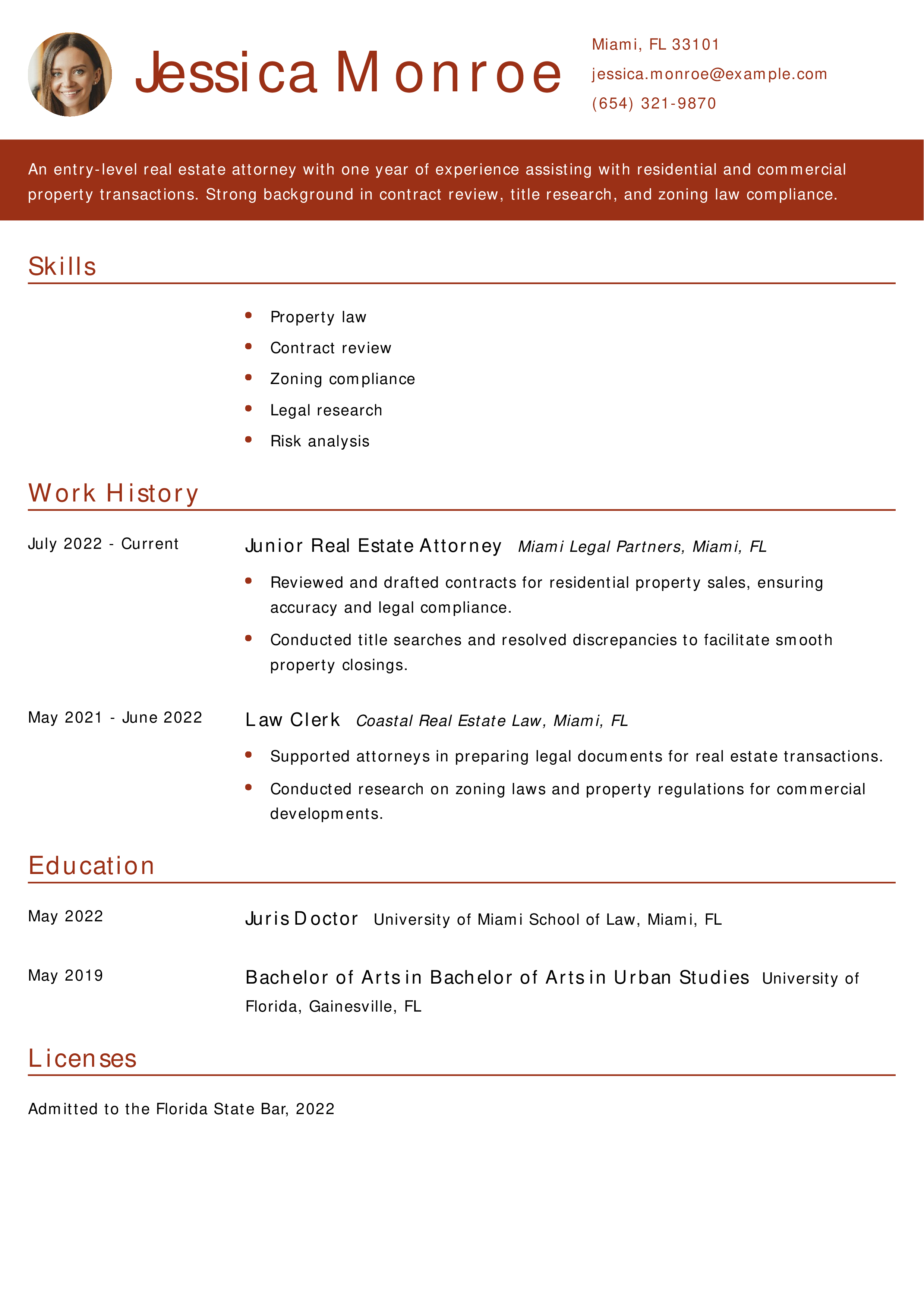
Why This Resume Works
Jessica’s resume highlights her foundational experience in real estate law, with specific examples of her contributions to transactions and compliance efforts. Her focus on zoning laws and property closings aligns well with entry-level roles.
Learn how to craft an impactful entry-level resume: How to Make a Resume.
Document Review Attorney Resume
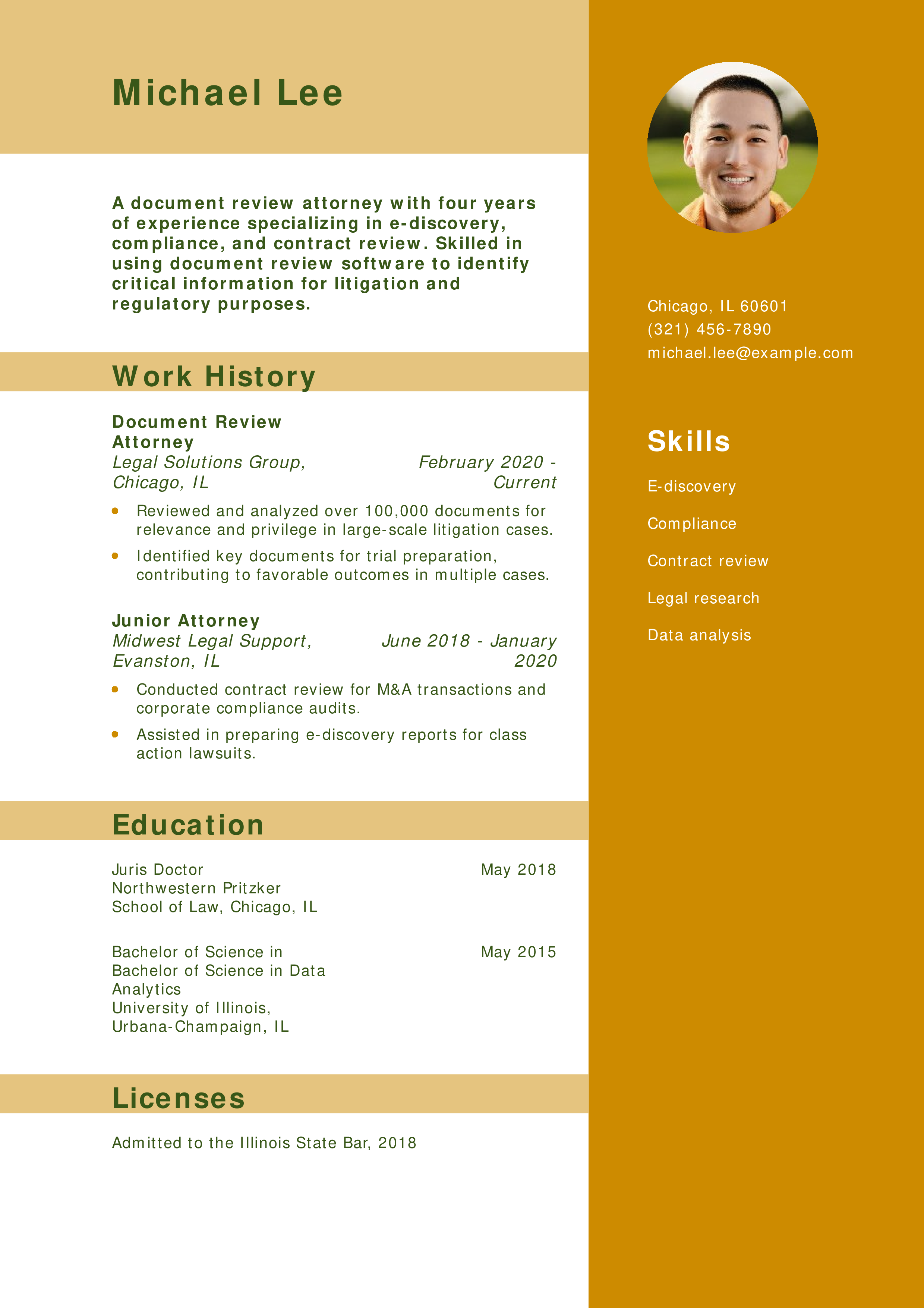
Why This Resume Works
Michael’s resume emphasizes his expertise in document review and e-discovery, with quantifiable contributions like analyzing over 100,000 documents. His technical skills in data analysis add depth to his profile.
Learn how to feature specialized legal skills: Technical Skills for Resume.
Civil Rights Attorney Resume
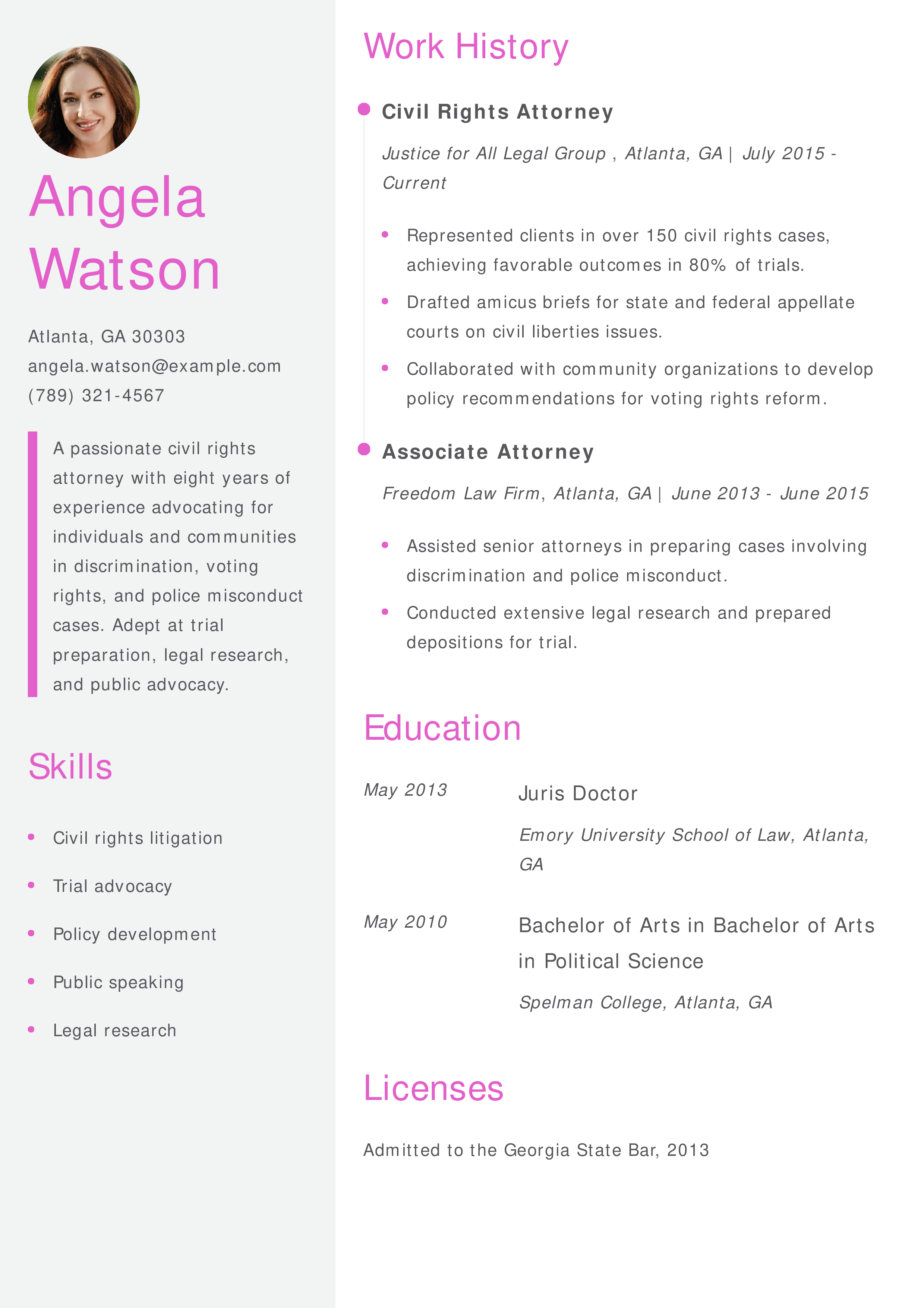
Why This Resume Works
Angela’s resume highlights her dedication to civil rights law with measurable outcomes such as an 80% trial success rate. Her experience drafting appellate briefs and collaborating on policy reform demonstrates a well-rounded skill set.
Learn how to emphasize public advocacy in legal resumes: Resume Interests Section.
Environmental Attorney Resume
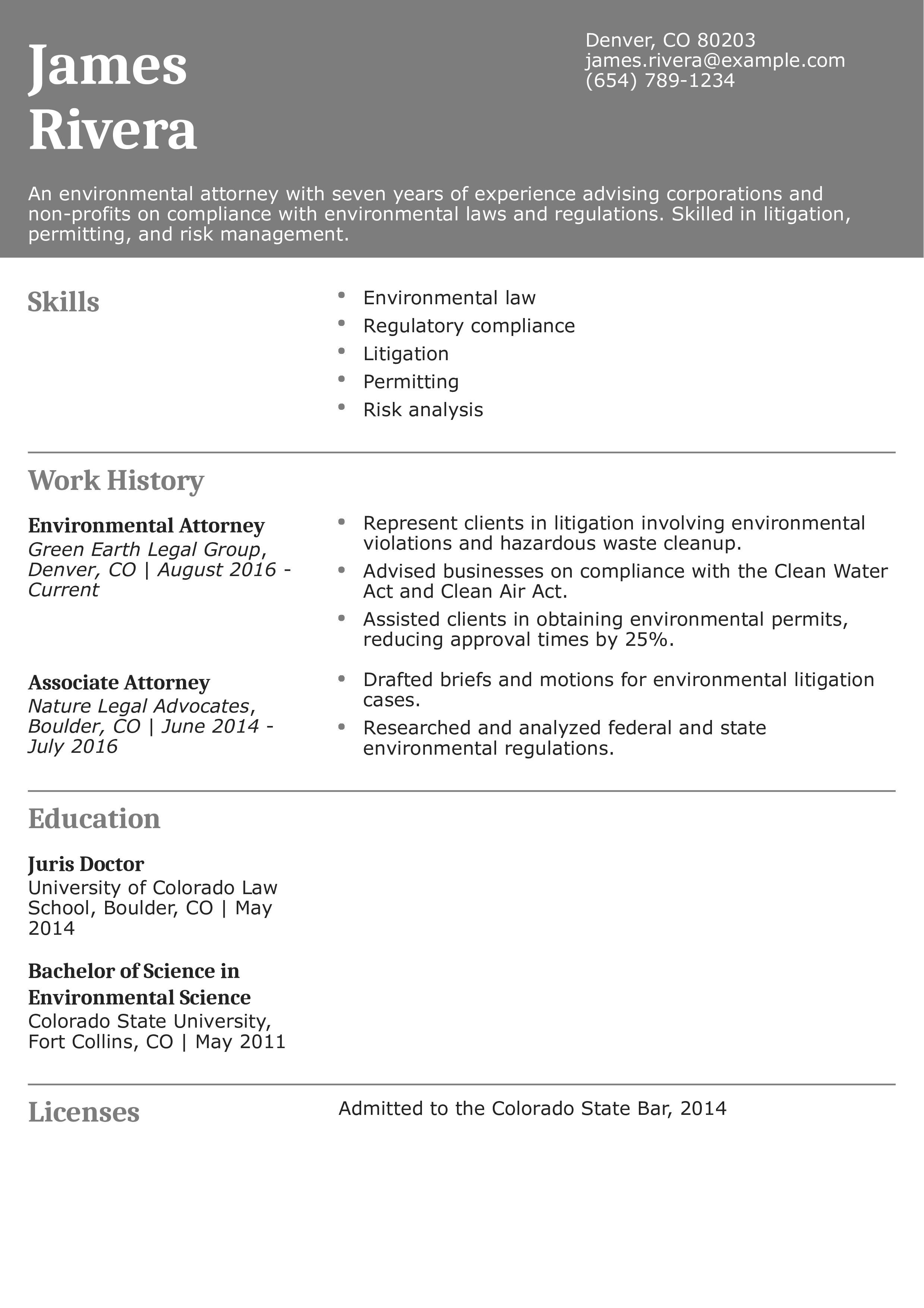
Why This Resume Works
James’ resume emphasizes his expertise in environmental law and his measurable contributions, such as reducing permitting approval times by 25%. His ability to navigate complex regulations adds depth to his profile.
Learn how to highlight regulatory expertise: Resume Outline Examples.
University Attorney Resume
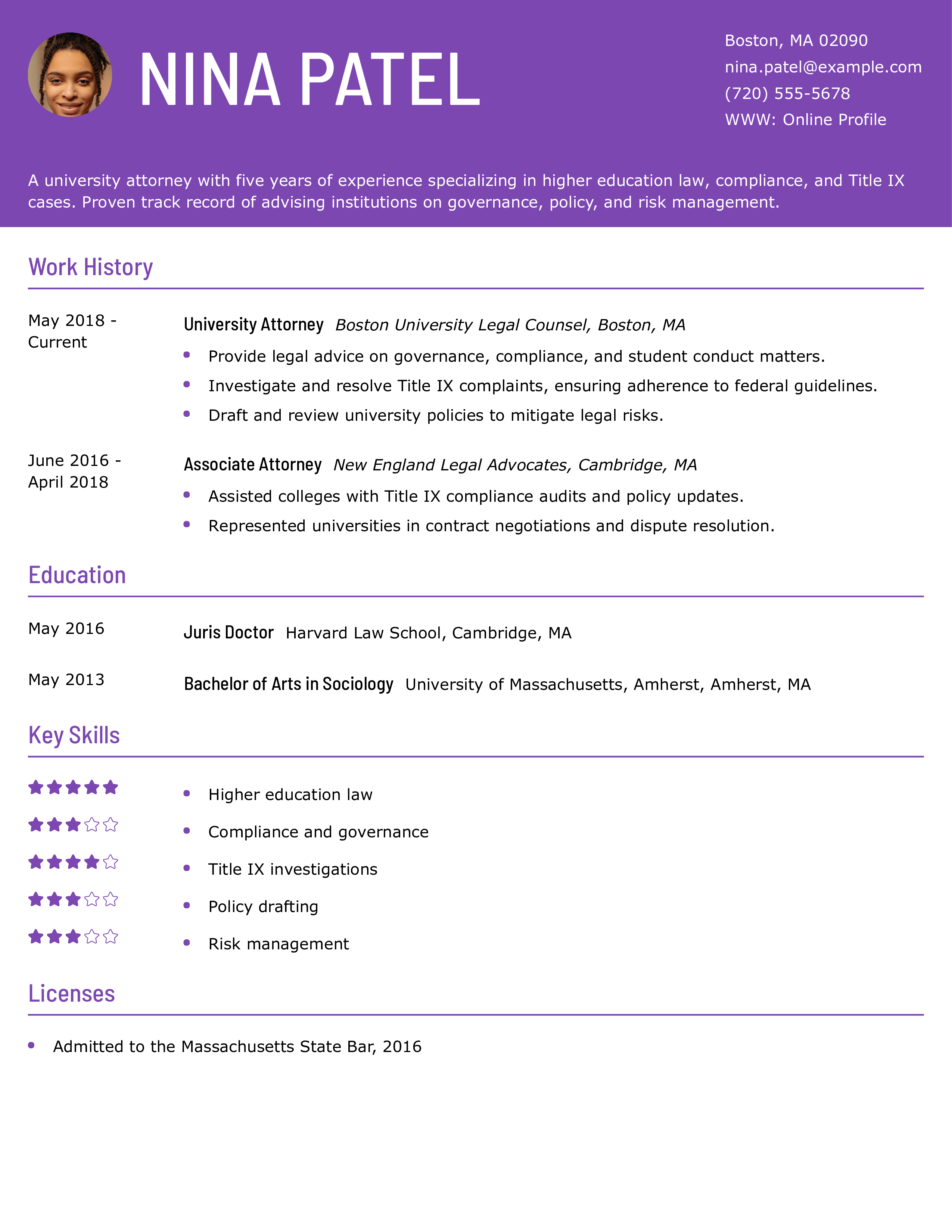
Why This Resume Works
Nina’s resume showcases her specialized expertise in higher education law and her experience resolving Title IX complaints. Her ability to draft governance policies and manage compliance issues is a standout feature.
Learn how to showcase niche legal expertise: How to List Relevant Coursework on Resume.
Associate Real Estate Attorney Resume
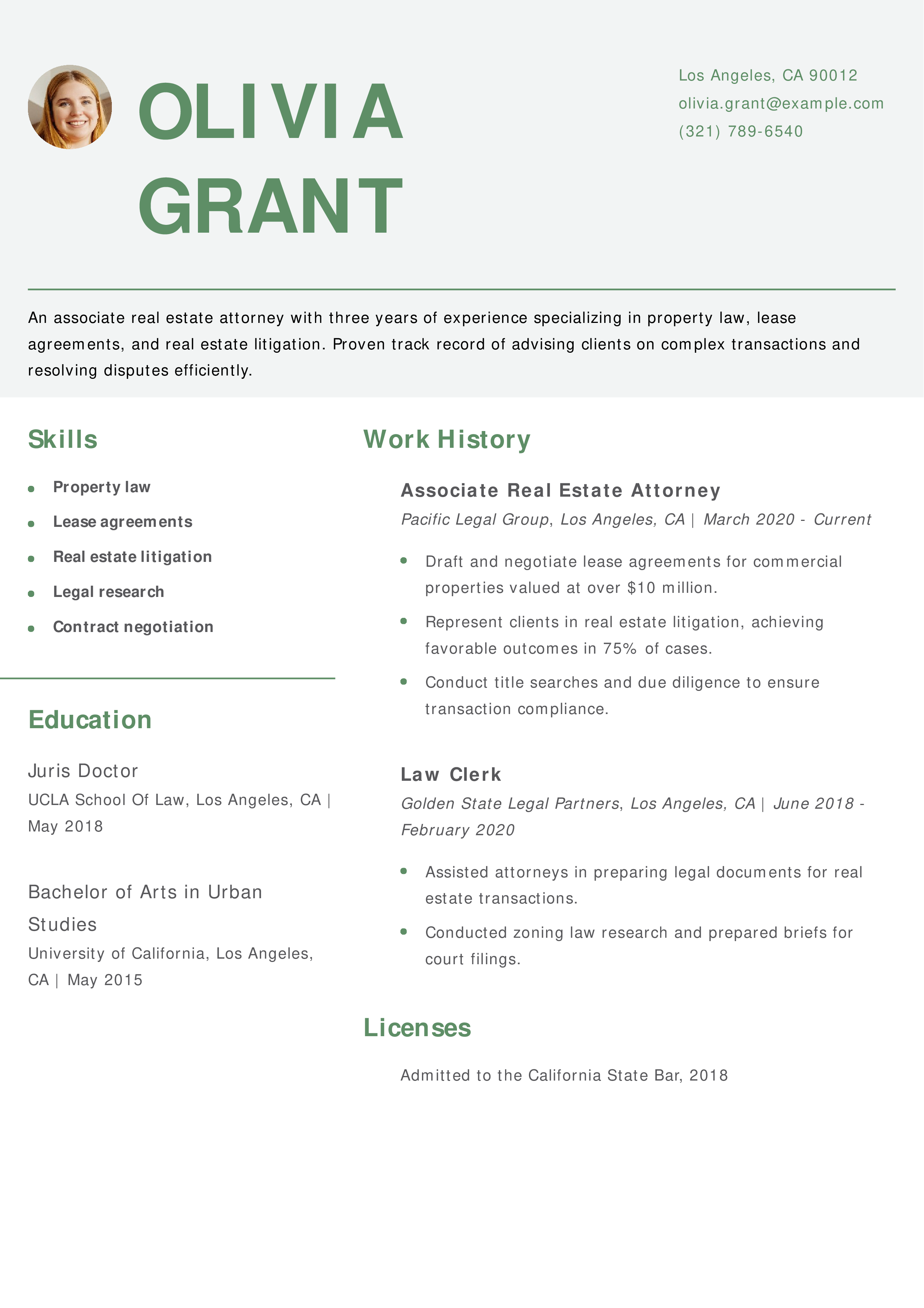
Why This Resume Works
Olivia’s resume emphasizes her expertise in lease agreements and real estate litigation. Metrics like 75% litigation success and $10 million transactions highlight her impact.
Learn how to feature success in real estate law: Best Resume Formats.
Criminal Defense Attorney Resume
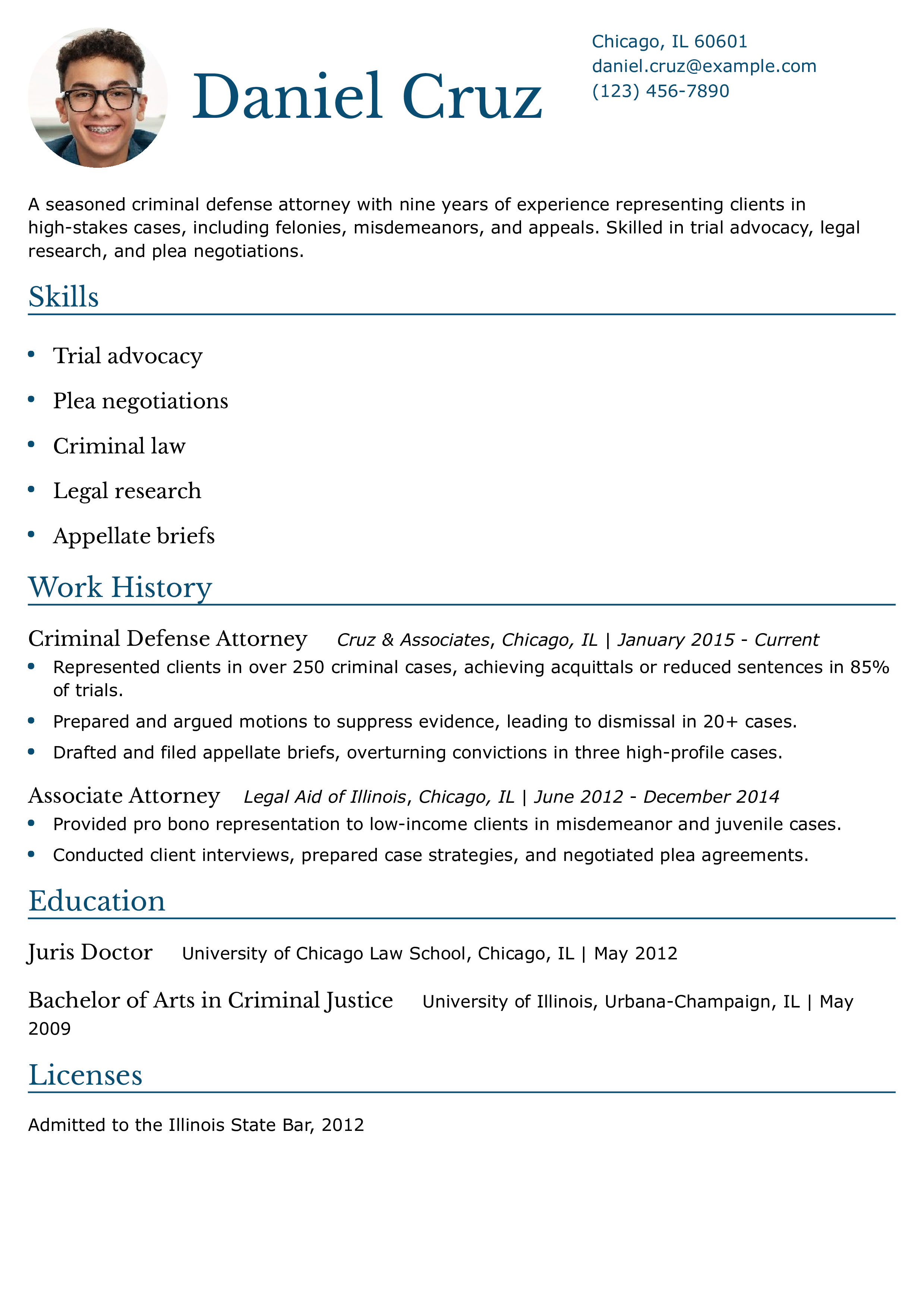
Why This Resume Works
Daniel’s resume highlights his extensive experience in criminal defense, with quantifiable outcomes such as an 85% trial success rate and multiple overturned convictions. His focus on high-stakes cases demonstrates his expertise and dedication.
Learn how to showcase trial experience: Resume Summary Examples.
Tax Attorney Resume
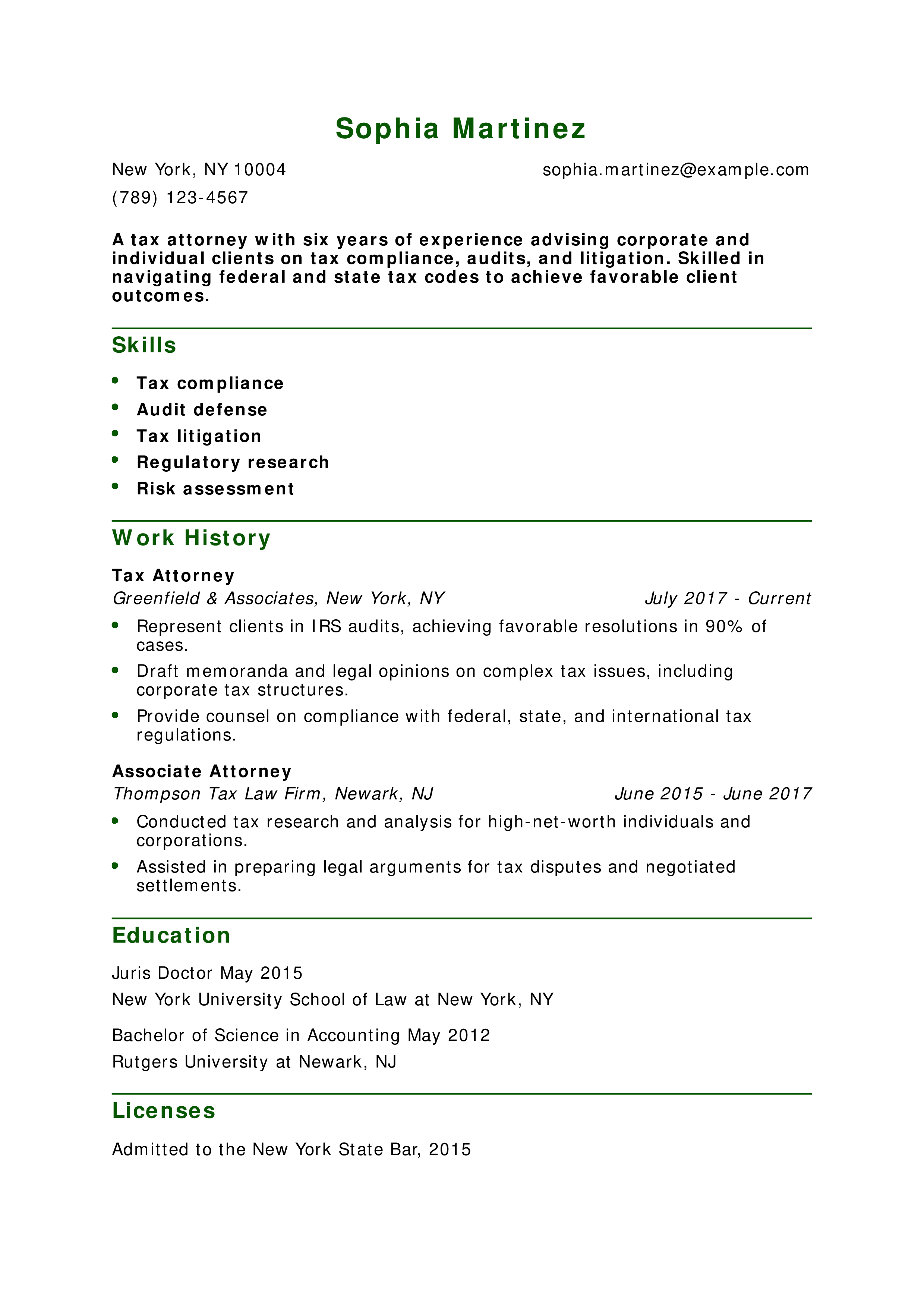
Why This Resume Works
Sophia’s resume highlights her expertise in tax law, with a focus on achieving favorable outcomes in IRS audits. Metrics like a 90% success rate showcase her effectiveness.
Learn how to feature specialized legal expertise: Technical Skills for Resume.
Patent Attorney Resume
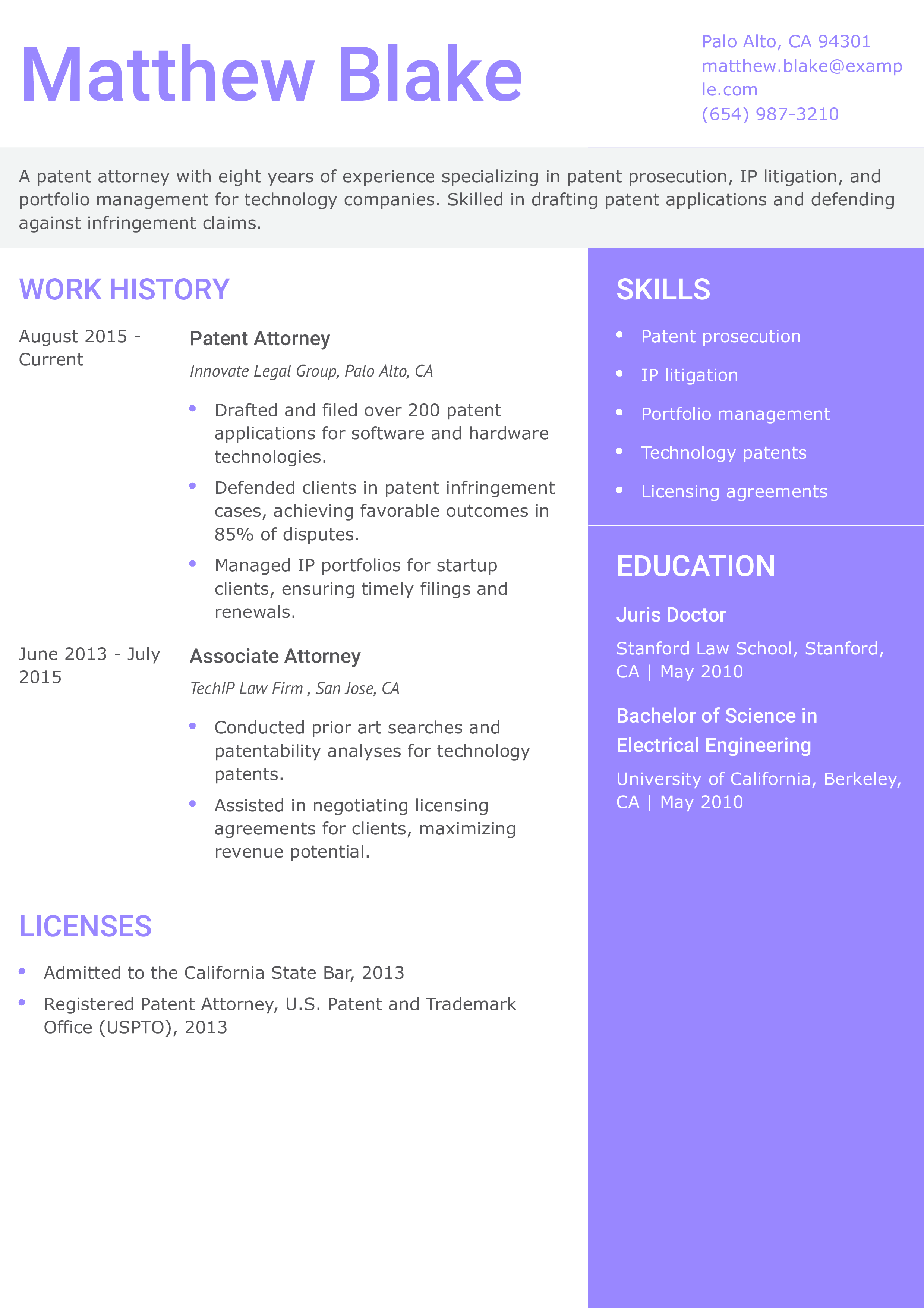
Why This Resume Works
Matthew’s resume highlights his specialization in technology patents, with quantifiable achievements like filing over 200 applications and resolving 85% of disputes favorably.
Learn how to showcase niche expertise: How to List Certifications on Resume.
Employment Attorney Resume
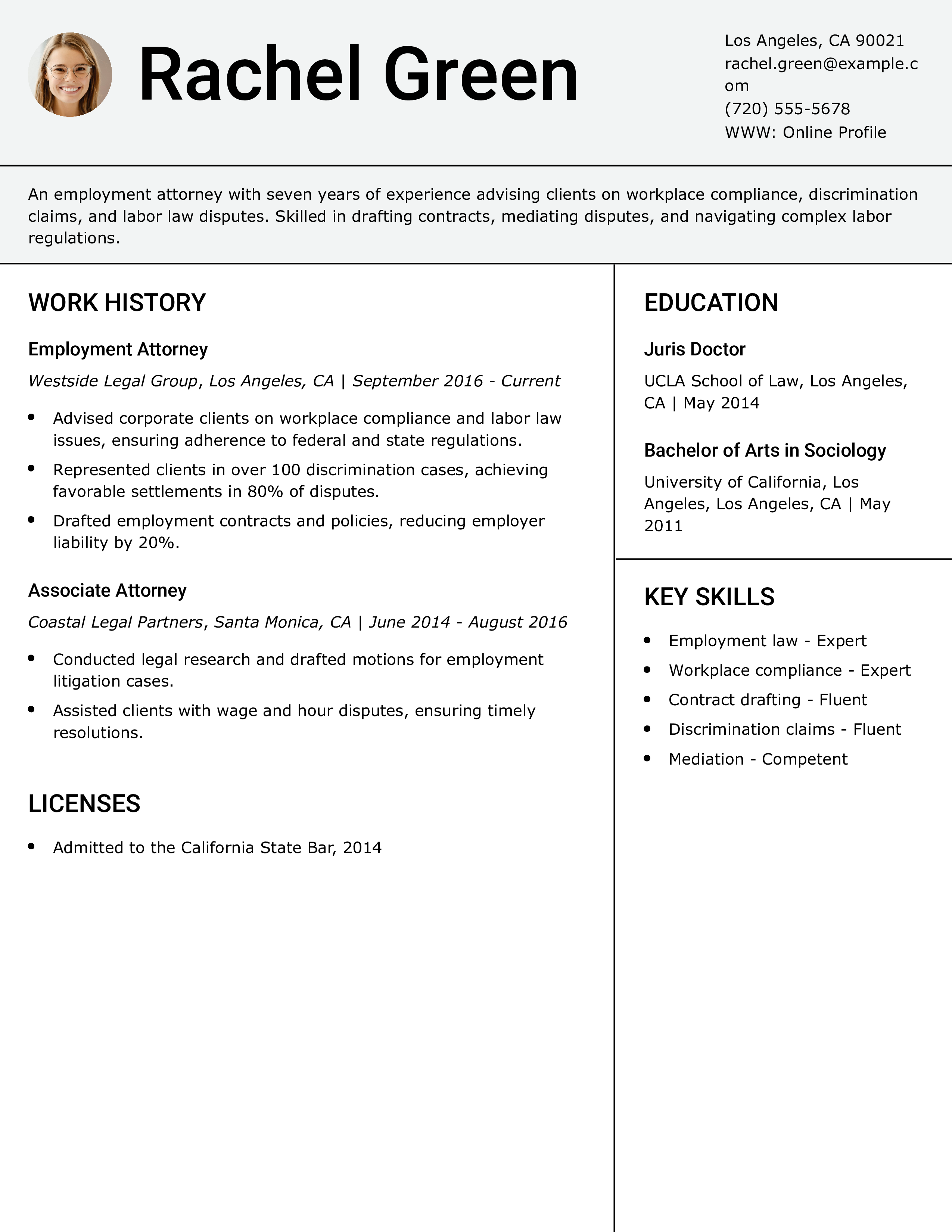
Why This Resume Works
Rachel’s resume demonstrates her expertise in employment law, with achievements like favorable outcomes in 80% of discrimination cases. Her ability to reduce liability and ensure compliance strengthens her candidacy.
Learn how to feature mediation skills: Soft Skills for Resume.
Our templates are crafted by professional resume writers to make creating your resume quick, easy, and effective.
- Professional resume template downloads
- Customized cover letter generation
- AI resume writing support
- Career-building resources and advice
Lawyer Text-Only Resume Templates and Examples
How To Write an Attorney Resume
1. Write a compelling profile summarizing your attorney qualifications
The profile summary is a short paragraph of just a few sentences about who you are as an attorney and how you can be an asset to a law firm. Mention the type of law you work in and where you excel compared to other lawyers, such as finding precedents to base your case on or representing clients in litigation.
If you’re an entry-level applicant, focus on your research skills and ability to collaborate with other lawyers and the firm’s legal team members.
Senior-Level Profile Example
Civil litigation lawyer with over 15 years of experience representing clients in personal injury cases. Takes depositions and has a proven track record of securing substantial settlements on behalf of clients. Consistently takes the initiative and delivers creative solutions that achieve positive results for clients and the firm. Works well in a dynamic and collaborative environment.
Entry-Level Profile Example
An enthusiastic, highly motivated attorney with over a year of experience and a solid academic record in law and business. Apply extensive research skills to independent assignments or collaborations with legal research and litigation teams. Adept at building strong professional relationships with colleagues and clients.
2. Add a results-driven professional attorney experience section
Being an attorney is all about results. In the experience section of your resume, show how you’ve utilized your skills to get clients the results they seek. In addition to describing your duties and responsibilities, add your win percentage and how many cases you worked on monthly. This gives a hiring manager a better idea of what you can bring to the firm.
Senior-Level Professional Experience Example
Litigation Attorney
Schaff, Turner, and Morner LLP, New York, NY | December 2010 – present
- Meet with potential clients to evaluate their cases and decide if the firm would take them on as clients – approximately 20 clients per month
- Represent and advise clients in matters involving civil litigation with a focus on personal injury and auto accident claims
- Possess courtroom experience and oral advocacy: lead negotiations for settlements before trial, lead counsel during jury trials, and status and settlement conferences in state and federal court
- Take and defend depositions of witnesses and experts
Entry-Level Professional Experience Example
Senior Law Clerk
Law Offices of Isaac L. Brooks, West Des Moines, IA | June 2019 – present
- Assist attorneys with transactional and litigation practice
- Research and draft legal memoranda in the areas of real estate, contracts, and other civil litigation
- Draft answers, complaints, motions, responses, and settlement agreements
- Help attorneys at real estate closings
- File pleadings at state and federal courts
3. Include relevant education and credentials
Your resume should also include your education and any relevant credentials. List your Juris Doctor degree, including where you went to school, when you graduated, and any other degrees you may have. Include a list of credentials and the date you were awarded them, such as when you were admitted to state bars or if you can represent clients in the U.S. Patent Office or immigration court.
Credentials
Template
- [Credential Name], [Awarded Year]
Example
- Admitted to Iowa State Bar Association, June 2019
Education
Template
- [Degree Name]
- [School Name], [City, State Abbreviation] – [Graduation Month and Year]
Example
- Juris Doctor
- New York University, New York City, NY – July 2002
4. List relevant key attorney skills and proficiencies
As an attorney, you wear a lot of hats. There’s research and case law to read through, and you need to communicate what’s going on in layperson’s terms to clients. Also, you must work professionally in high-stakes and often high-conflict situations with other attorneys and the judge.
Distilling these skills into a bulleted list can be difficult, but it’s essential to creating a resume that gets you a job offer. Below, we’ve provided a list of critical skills and proficiencies for attorneys to help you get started.
| Key Skills and Proficiencies | |
|---|---|
| Adaptability in law | Analytical thinking |
| Attention to detail | Case preparation and strategy |
| Client counseling and management | Complex legal concepts |
| Conflict resolution | Ethical conduct |
| Knowledge of laws | Legal research and analysis |
| Negotiation and persuasion | Teamwork and collaboration |
| Time management | Trial and courtroom experience |
How To Pick the Best Attorney Resume Template
Using a template to help create your attorney resume can save you time and make it easier to plug your skills, qualifications, and work history into an already formatted design. But it’s still important to put some thought into the template you choose. Ideally, look for well-organized templates that can be quickly scanned or read.

Erica Pizem - Legal Recruiter and Expert Contributor, Linkedin
Meet our Expert: Erica is a licensed attorney and legal recruiter, whose primary focus is successfully matching lateral attorney candidates with both large and boutique law firms in the New York City area.
1. What are the most in-demand skills for attorneys that should be featured on a candidate's resume?-
Prospective attorneys should detail their relevant experience and expertise in the prospective employer's field of law. A potential candidate must manage a case from inception to completion and prepare, proofread, and file legal documents and discovery. A candidate should emphasize their ability to write and think analytically, be comfortable in a team or individual setting, and delegate work to legal assistants and paralegals.
2. What work experience and other accomplishments are hiring managers seeking in an attorney?-
Hiring managers are looking for candidates who know the law the prospective employer specializes in and who can manage various cases with multiple deadlines. Therefore, detail-oriented, organized people who can multitask are desirable.
Candidates should also have excellent communication skills, as the attorney usually is the primary contact for clients and opposing counsel. Attorneys should highlight their extensive legal research and writing skills and familiarity with electronic databases like Westlaw or LexisNexis.
3. What else, besides a resume, should an attorney candidate be prepared to provide hiring managers?-
A prospective attorney should provide a cover letter along with their resume detailing the employer's relevant experience and skills in law. Also, submit a writing sample highlighting a candidate's ability to think critically and analytically.
The writing sample should be 10 pages long, preferably a document filed in court (redacting the privileged and confidential portions), not merely an internal memo.
4. What advice would you give an attorney candidate about their job search?-
A prospective attorney seeking a position should attend networking events such as bar association events, law school alum events, and even fundraisers and charity events that local law firms sponsor.
Finally, a candidate should have an updated LinkedIn profile. This is the first website a prospective employer will often visit when researching a candidate.
Frequently Asked Questions: Attorney Resume Examples and Advice
Why should I use an Attorney resume example as a template for my own resume?-
An Attorney resume example provides a solid foundation for structuring your own resume. It showcases how to highlight achievements, use quantifiable metrics, and present your experience in an organized manner. You can personalize it by adding your unique qualifications and adjusting sections to better reflect your skills and career history.
What are common action verbs for attorney resumes?-
When writing the professional experience section of your resume, it’s easy to feel like you're repeating yourself. Finding a unique action verb to start every bullet on your resume can take some creativity (and maybe a good thesaurus). We've created a list of common action verbs to describe job duties and responsibilities on your attorney resume. You may also find some ideas in the job description of the position you're applying for.
| Action Verbs | |
|---|---|
| Advised | Analyzed |
| Appealed | Argued |
| Assisted | Conducted |
| Cross-examined | Defended |
| Drafted | Filed |
| Interviewed | Investigated |
| Mediated | Negotiated |
| Prepared | Presented |
| Provided | Represented |
| Researched | Reviewed |
How do you align your resume with a job description?-
The Bureau of Labor Statistics expects around 10% job growth for lawyers through 2031, which is faster than average. As you apply for positions, tailor each resume to the job description. You can skim the description to find key skills, qualifications, keywords, and job duties and add those to your resume as they fit in the various sections. Usually, it is easiest to work these topics into the key skills and professional experience sections.
What is the best attorney resume format?-
There are a few styles regarding resume formats, but the best choice for an attorney resume is usually reverse chronological. This format is traditional for resumes, with your professional experience making up most of the resume.
List your previous positions, starting with the most recent and working backward. If you've had an extensive career, limit this section to only those that are the same type of law or highly relevant.
What’s the recommended length for an attorney resume?-
The recommended length for an attorney resume is one page, especially for professionals with under 10 years of experience. A two-page resume can work for those with substantial accomplishments or a longer career, but only if it’s concise and highly relevant to the role. Tailoring your resume to the job and highlighting your strongest qualifications are key to success.
Stick to listing work experience from the last 10 to 15 years, as this period is most relevant to employers. Summarize or omit older positions unless they’re crucial for your application. A focused and streamlined resume will help capture the hiring manager’s attention.
Craft your perfect resume in minutes
Get 2x more interviews with Resume Builder. Access Pro Plan features for a limited time!

Make sure to include a matching attorney cover letter with your resume. The cover letter is where you can provide more detail on who you are as a candidate, your professional accomplishments, and why you’ve chosen to apply to this particular firm. If you need help drafting the cover letter, these examples can help.




